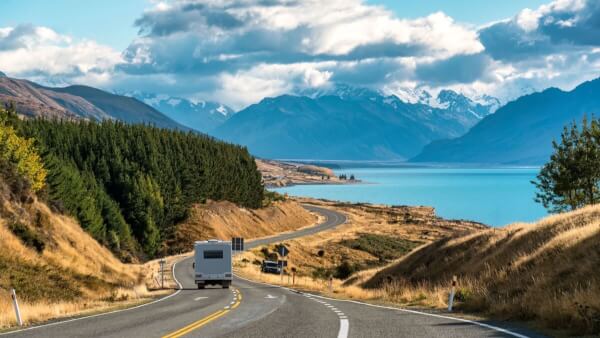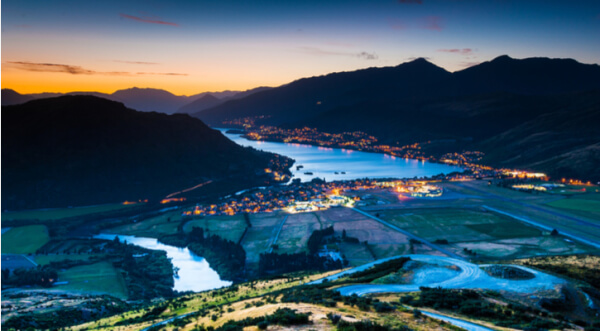Cash or card in New Zealand: Which is the best way to pay?
Should you pay with cash or card in New Zealand? A handy guide including cash etiquette, New Zealand ATMs and using your UK card.

Key takeaways:
Planning the trip of a lifetime to New Zealand? We’re here to help, with a handy guide for UK travellers visiting New Zealand for the first time.
We’ll cover everything you need to know, including visas and entry requirements, health and safety essentials, money and currency, laws and customs, and much more. It’s all to help you have a safe, enjoyable and memorable trip.
We’ll also show you a convenient and cost-effective way to spend in New Zealand – the Wise debit card. It’s designed for low-cost spending in 150+ countries. This clever international debit card automatically converts your pounds to New Zealand dollars (NZD) whenever you spend, for low, transparent fees* and mid-market exchange rates.
Learn more about the Wise debit card 💳
Before you start booking your flights to New Zealand though, you’ll need to know about the country’s entry requirements for UK nationals.
The good news is that you don’t need to apply for a visa in advance to visit New Zealand as a tourist from the UK. You can stay for up to 6 months without a visa.
However, you will need to apply for a New Zealand Electronic Travel Authority (NZeTA) before you travel. This costs from $17 NZD (around £7.50 in GBP) and lasts for 2 years. It’s also important to note that it takes around 72 hours for applications to be processed, so make sure you leave adequate time before your flight.
You’ll also need to make sure your passport is valid for at least 3 months after the date you plan to leave New Zealand.³ Bear in mind though that most countries require at least 6 months remaining validity, so it may be best to renew your passport early - just in case.
On entering New Zealand, you may also be asked by border control officials to show proof of a return flight ticket and proof that you have enough money to cover your stay.³
You can’t work or study in New Zealand without a visa. So if you plan to do either during your trip, you’ll need to apply for the appropriate visa.³
New Zealand is generally considered to be very safe for tourists and foreign visitors. It has a low crime rate and its people are known to be friendly and welcoming on the whole.
However, the UK Government’s Foreign, Commonwealth and Development Office (FCDO) does warn travellers to be vigilant against street crime - which does happen in some of New Zealand’s major towns and cities. It particularly mentions crime affecting unattended vehicles.¹
And as with any foreign travel, it’s important that you take sensible precautions to ensure your safety. We’ll cover some safety tips, including emergency contact information, later in this guide.
Flight times from the UK to New Zealand vary depending where you’re travelling to and from in both countries.
But to give you an idea, the flight time between London Heathrow and Auckland is around 24 hours at its fastest - including at least one stop-off.²
It’s always a good idea to read up on health information when visiting a foreign country. The last thing you want is for your dream holiday to be ruined by illness, or to be turned away at the border because you don’t have the required vaccinations.
According to Travel Health Pro, travellers to New Zealand should ensure they are up-to-date with all the usual recommended UK vaccinations. This includes the measles-mumps-rubella (MMR) vaccine and diphtheria-tetanus-polio vaccine. Tetanus vaccinations should also be up-to-date.⁵
But otherwise, there aren’t any country-specific health risks, diseases or illnesses you need to know about for New Zealand.
But as with all overseas travel, you should bear these general health tips in mind:

We’ve looked at health advice for New Zealand, but it’s also important to think about how you’ll stay safe during your trip.
Here are some tips to remember:
If you experience an emergency situation during your trip, the number to call for fire, ambulance or police services is 111.⁶ This is New Zealand’s equivalent to 999 in the UK.
Make sure you have the number of your travel insurance provider too, in case you need to make a claim or seek assistance.
If you’re planning on travelling around the city you’re visiting or even different parts of the country, it’s useful to know about New Zealand’s public transport system.
Within cities, you’ll have a choice of buses, trains and ferries to help you get around. And for travel between towns and cities, you can use the country’s national bus network InterCity. To move between the North and South Islands, you can hop on one of the regular ferry services.
There are also a number of scenic rail journeys available, with a particular highlight being the day-long trip between Auckland and Wellington on New Zealand’s North Island.
Want to get out and explore New Zealand’s famously stunning rural landscapes? You might need to hire a car.
You’ll need to be at least 21 years old to hire a car, although some hire companies will add a surcharge if you’re under 25. You can use your UK driving licence, so there’s no need to get an international driving permit.⁷
Before setting off, you’ll need to make sure you know the rules of the road in New Zealand. Helpfully, vehicles drive on the left there - just like in the UK.
It’s always recommended to brush up on local rules, laws and customs in the country you’re visiting.
New Zealand culture isn’t too different to what you’re used to back in the UK, but there are still some important rules and laws you need to know:¹
Tipping isn’t customary or expected in New Zealand, as customer service workers generally earn a fair wage and aren’t reliant on tips for their income.
The main language spoken in New Zealand is English. However, a small percentage of the country’s population speak Te Reo Māori or Samoan.
Now, you’ll need to know the best way to spend while in New Zealand, as well as how to manage and convert your money.
The first crucial thing to know is the official currency, which is the New Zealand dollars (NZD). The symbol for it is $, although you’ll also see it written as NZ$ to distinguish it from other countries like the USA which use the dollar sign.
You can change your British pounds for NZ dollars here in the UK, or when you arrive. Just make sure to check the exchange rate and fees, to make sure you’re getting a good deal.
It’s usually best to avoid changing currency in airports or hotels, as they are notorious for offering very poor deals in exchange for the convenience they offer.
Spending on a debit or credit card is also an option - you’ll just need to check whether your bank or card provider charges fees for spending in foreign currencies.
Debit and credit cards are widely used in New Zealand, especially in major towns, cities and tourist areas. Cash is still used, but it’s becoming less common. You might find that you need to have a few NZ dollars in cash handy for shopping at markets or buying street food.
You’ll find plenty of ATMs in New Zealand, usually located in shopping centres, main streets, central plazas and outside New Zealand banks. And most ATMs will accept international cards along with locally-issued ones.
Read more about cash vs. card in New Zealand here, to help you work out the best way to spend during your trip.
Open a Wise account online and you can order the Wise debit card for a one-time fee of £7. You can use this clever card in 150+ countries, including New Zealand. It automatically converts your pounds to local currency whenever you spend using the mid-market exchange rate, only adding a tiny, transparent conversion fee* – or it’s free if you already have the local currency in your Wise account.
You also get two free ATM withdrawals for up to 200 GBP (or currency equivalent) each month. Wise will not charge you for these withdrawals, but additional charges may occur from independent ATM networks.
And that’s about it - everything you need to know about travelling to New Zealand from the UK.
We’ve looked at all the essentials, including visas and entry requirements, health and safety, transport, money, currency and language. You should be all set to pack your suitcase and prepare for the (very long) flight to New Zealand from the UK.
Have an amazing trip!
Sources used:
Sources last checked on date: 28-Mar-2025
*Please see terms of use and product availability for your region or visit Wise fees and pricing for the most up to date pricing and fee information.
This publication is provided for general information purposes and does not constitute legal, tax or other professional advice from Wise Payments Limited or its subsidiaries and its affiliates, and it is not intended as a substitute for obtaining advice from a financial advisor or any other professional.
We make no representations, warranties or guarantees, whether expressed or implied, that the content in the publication is accurate, complete or up to date.

Should you pay with cash or card in New Zealand? A handy guide including cash etiquette, New Zealand ATMs and using your UK card.

Need to know how much cash can you take to NZ? Read our guide for info on the rules for taking cash in and out of New Zealand.

Check out our in-depth guide on everything you need to know about buying a prepaid New Zealand SIM card, including different providers, pricing, and features.

Whether you’re heading to New Zealand on a once-in-a-lifetime holiday or to set up your new home, you’ll need to find out how money works in the country....

While credit and debit card payments are incredibly popular in New Zealand (almost more so than they're in Europe), it’s still a good idea to have some cash...